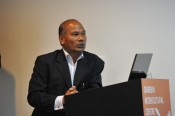By Deepak Chopra, Co-author, ‘Super Brain: Unleashing the Explosive Power of Your Mind to Maximize Health, Happiness, and Spiritual Well-Being’; founder, The Chopra Foundation
 At the human level everyone would like to feel that life has meaning, which implies that the setting for life — the universe at large — isn’t a cold void ruled by random chance. There is a huge gap here, and for the past century science hasn’t budged from its grandest assumption, that creation is ruled by random events. There was good reason for this adamant position. The mathematics of modern physics is a marvel of precision and accuracy. No guiding hand, creator, higher intelligence or deity was needed as long as the equations worked.
At the human level everyone would like to feel that life has meaning, which implies that the setting for life — the universe at large — isn’t a cold void ruled by random chance. There is a huge gap here, and for the past century science hasn’t budged from its grandest assumption, that creation is ruled by random events. There was good reason for this adamant position. The mathematics of modern physics is a marvel of precision and accuracy. No guiding hand, creator, higher intelligence or deity was needed as long as the equations worked.
Now there is a crack in the theory, tiny at first but opening into a fissure, that casts doubt on how science observes the universe. The fault isn’t that the mathematics was wobbly and loose. Quite the opposite. The universe is too finely tuned to fit the random model. God isn’t going to leap into the breach, although religion has reason to feel better about not accepting the so-called “accidental universe.” The real fascination lies in how to match reality “out there” with the potentiality of the human mind. Both are up for grabs.
In the modern era, Sir Arthur Eddington and especially Paul Dirac first noticed that certain “coincidences” in dimensionless ratios can be found. These ratios link microscopic with macroscopic quantities. For example, the ratio of the electric force to gravitational force (presumably a constant), is a large number (about 1040), while the ratio of the observable size of the universe (which is presumably changing) to the size of an elementary particle is also a large number, surprisingly close to the first number (also about 1040). It is hard to imagine that two very large and unrelated numbers would turn out to be so close to each other. Why are they? (For earlier examples of fine tuning, please see our first post, which gives some general background as well.)
Dirac argued that these fundamental numbers must be related. The essential problem is that the size of the universe is changing as the cosmos expands, while the first relationship is presumably constant, given that it involves only two supposed “constants.” Why should two very large numbers, one variable and the other not variable, be so close to each other? (It’s like seeing a person’s vocal chords vibrating in all kinds of ways and yet discovering that each word he speaks is exactly half a second apart — even this image is a simplification compared to the actual problem, which spans similar ratios in terms of light years and time in the trillionth of a second.) Read the rest of this entry »
















































